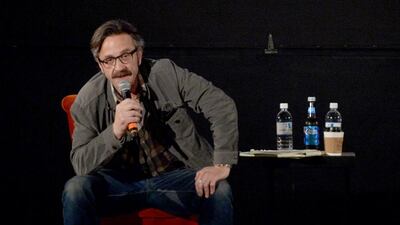In October 1938, the one-hour adaptation of H G Wells's The War of the Worlds, directed by Orson Welles, was broadcast on CBS Radio in the United States. A story of aliens invading rural New Jersey rendered as news broadcasts and authentic-sounding updates, it was a little too convincing. There are legends of panic in the streets, mass hysteria and heart attacks.
That may have been the high point of the influence of radio drama, certainly in the US. Listener figures fell away steadily with the advent of television, but that may be changing as the podcast industry shifts gear.
Podcasts – audio files easily downloaded on laptops, tablets or smartphones and consumed at listeners' convenience – are booming. The success of Serial in 2014, the first podcasting breakout hit with more than 40 million total downloads, ushered in a new phase of expansion.
The first podcasts were cheap, lo-fi productions, often just one or two voices speaking into your ear. This intimacy was part of their appeal, as well as the low barrier to entry and lack of gatekeepers – all you needed was a laptop, a microphone and access to a web server. Since Serial, listeners have surged and stakes have risen.
The recent US-produced Edison Research report revealed that podcast listeners doubled between 2008 and 2015, and then increased by another 23 per cent between 2015 and 2016. In the US alone – the largest podcast market, and the only one to have conducted reliable research – that means 57 million monthly listeners. And with listeners come money – a podcast with 100,000 weekly downloads (just edging into the bottom of the iTunes top 100) can command Dh1.5 million a year in advertising. Serial averaged over 1.5 million downloads per week. Marc Maron, whose 2015 interview with US president Barack Obama on his WTF show crowned the rise of the medium, makes more from his podcast than from his TV sitcom.
While the US is leading the way, the UAE has its own podcasting presence with the likes of Hebah Fisher, who is behind Kerning Cultures, in which a team of producers unearth compelling stories of entrepreneurship, science, history and culture, and Nicholla Henderson Hall, who launched The Learning Curve – a chat show about female entrepreneurs in the Middle East.
Advertising on podcasts is effective because the advertisements aren’t external to the show: they are read by the hosts themselves, a personal endorsement from people we have grown to know and trust.
Here come the networks
This personal connection is important. Brian Koppelman, the host of The Moment with Brian Koppelman, in which he speaks to creative professionals about the hinge moments in their creative lives, is a high-level Hollywood writer and producer who chooses to maintain his podcast because "it is an incredibly intimate form. The voice is in your ear, the sonics are designed to burrow in. It allows a relationship to develop".
In 2014, Alex Blumberg created the Gimlet podcast network, joining other podcast companies such as Panoply, Radiotopia and Midroll Media, and also owns the Earwolf network. As the networks gather strength by developing new shows and experimenting with new forms, podcasting is approaching a creative and economic tipping point, similar to the evolution of network television in the 1950s and 1960s. Production values increase, shows are more exquisitely produced, quality rises in the search for new ears, but there are potential pitfalls.
Fact to fiction
This year will be a hinge year. Podcasts have been mostly conversations and narrative journalism, but the networks are taking the leap into fiction. In 2016, Panoply had a surprise hit with The Message, a sci-fi serial sponsored by GE, downloaded five million times. The Gimlet network rose to meet it with Homecoming, featuring stars such as Catherine Keener, Oscar Isaac and David Schwimmer and a genuinely sophisticated sound design.
Less inventive but still gripping is Life/After from Panoply, another 10-part sci-fi series, and the early part of this year will see the first independent audio-drama from Hollywood rather than New York-based networks: Bronzeville, with Laurence Fishburne, written by Oscar-nominated Josh Olsen. Even the BBC is planning to offer a new platform, described as a "Netflix of the spoken word".
Too fast, too soon?
While the plethora of options point to the notion we are experiencing the golden age of podcasts, "one problem is that the number of new offerings is outstripping the numbers of listeners", says Mike Pesca, presenter of Panoply's daily news-and-opinion show, The Gist. "It's an embarrassment of riches for listeners, but it's harder for individual podcasts to stand out," he says.
If you’re not part of one of the networks or you don’t have a celebrity attached as host, it becomes harder to gather an audience. Even within the networks, unless you deliver 10,000 listeners from the start, it’s more difficult to have the time to noodle along.
Fortunes will be made and some might be lost, but this is clear: 2017 is a watershed year for the podcast industry.
artslife@thenational.ae

